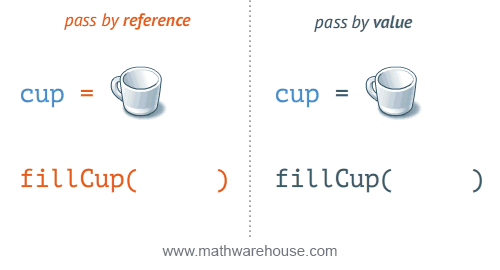Reference Versus Value
#include <iostream>
using namespace std;
// CALL BY VALUE is the default way of passing parameters
// in C/C++: the parameter is a COPY of the original, so
// the function can't change the original.
int changeByValue(int x, int amount);
// CALL BY REFERENCE is indicated by the (&) after the type
// of the parameter. It means the parameter is initialized
// as a reference (aka a pointer) to the original value,
// so it can change the original.
int changeByRef(int& x, int amount);
int main(){
int x = 10;
changeByValue(x, 23);
cout << "x = " << x;
changeByRef(x, 23);
cout << "x = " << x;
return 0;
}
int changeByValue(int x, int amount) {
x = x + amount;
return x;
}
int changeByRef(int& x, int amount) {
x = x + amount;
return x;
}
An illustration by Mathwarehouse:

Swapping 2 Variables
#include <iostream>
using namespace std;
void swapVals(int& x, int& y){
int z = x;
x = y;
y = z; // original x value
}
int main() {
int x = 20;
int y = 5;
cout << "before swap: x = " << x << " and y = " << y << endl;
swapVals(x, y);
cout << " after swap: x = " << x << " and y = " << y << endl;
return 0;
}